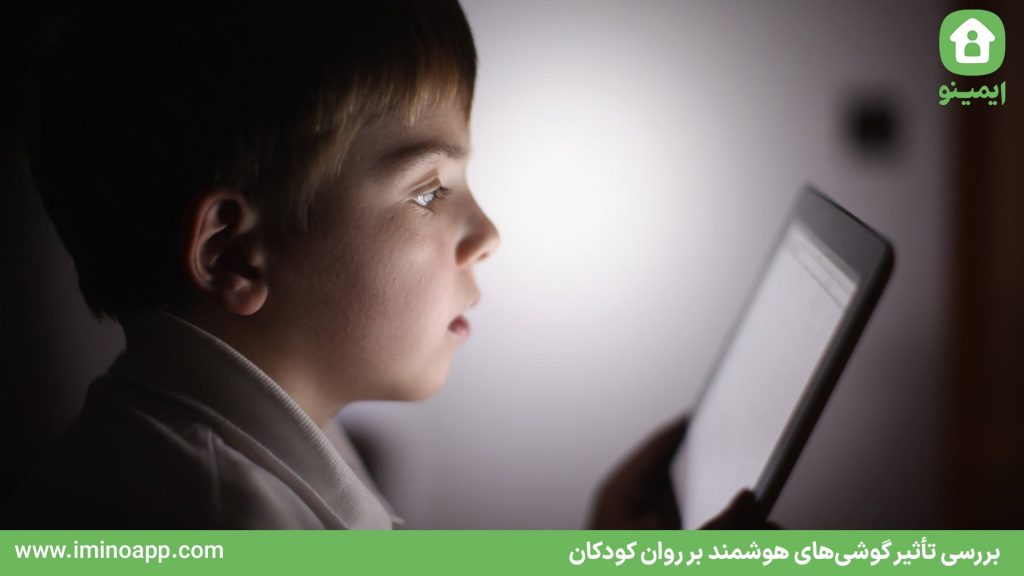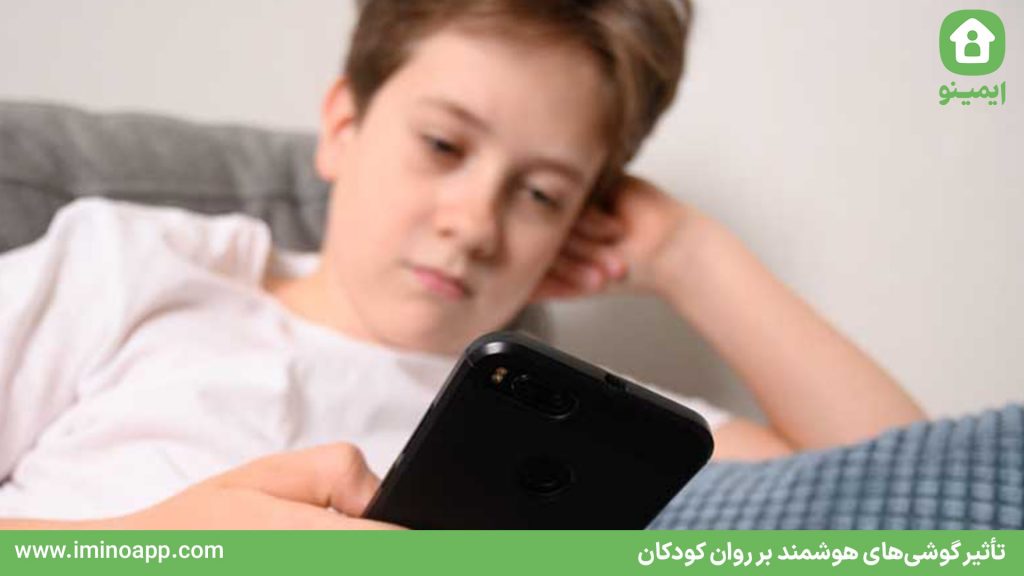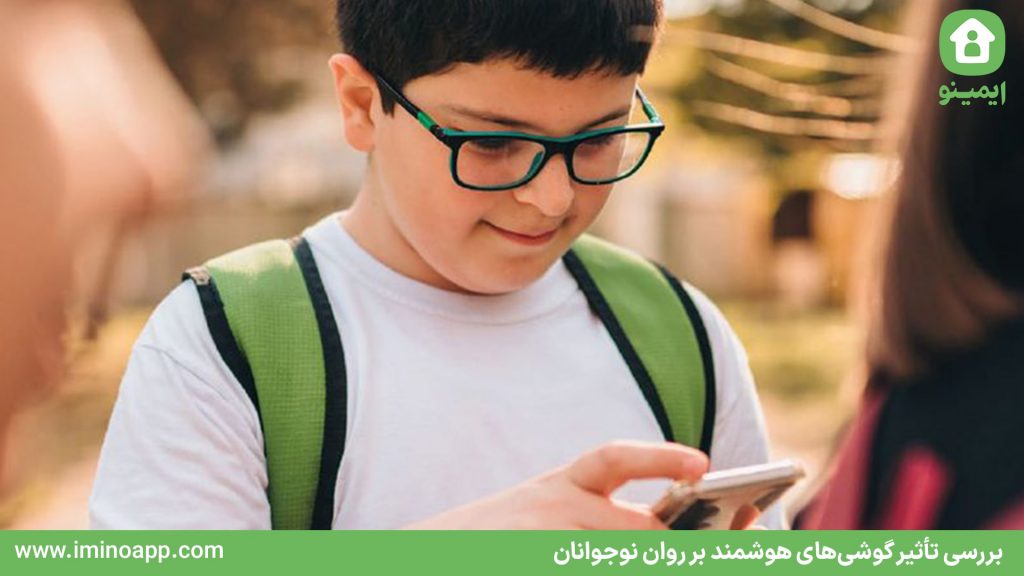Examining the Impact of Smartphones on Children’s Mental Health
The impact of smartphones on children’s mental health becomes a serious concern for everyone when we see even toddlers holding a mobile device, staring at the screen. This is where the first question arises in our minds: “How early is too early?!”
Every parent who, before the COVID-19 pandemic, tried to limit their child’s screen time found that those restrictions were broken after the outbreak. Because children had to spend hours in front of their phones to continue their learning process. But if we think more deeply, we realize that even before the era of virtual education, young children were as immersed in technology as adults. With this in mind, the second question that comes to mind is whether children’s use of technology is beneficial for their development?
Learn More: What Gaps Exist for Vulnerable Children in Digital Life?
Children and Mobile Phones
Compared to even 5 or 10 years ago, more children are using smartphones and learning how to use them much earlier than they should. In a 2020 survey conducted by the Pew Research Center, 60 percent of children were exposed to smartphone use before the age of 5. In this group, 31 percent had become familiar with mobile phones before the age of 2.
Positive Opportunities and the Impact of Smartphones on Children’s Mental Health

Some experts believe that when children learn how to use mobile devices, suitable opportunities arise for them to have a better developmental path. In fact, they claim that the impact of smartphones on children’s mental health can have positive aspects. According to experts at Concordia University Nebraska, technology can help children become familiar with the functional use of various symbols and develop technological literacy.
Dr. Eva Lazar, director of The Lazar Center in New Jersey, says: “Technology is an incredible educational tool. Young children can learn a lot from educational programs like Sesame Street and strengthen their relationships with family members who are not physically present.”
When we grew up, we refreshed our memories by looking at family photos, keeping address books, and arranging annual photo calendars. But many people from Generation Z and younger are unaware of these things. Their entire lives are stored on the smartphones we’ve given them and in the cloud that holds all their memories.
They may think that life stops or continues with the charging and draining of a battery. But it is important that they learn from childhood to balance their virtual and real lives to enjoy the beauties of life away from screens as well. Like any other good thing, moderation is essential in this case too. Excessive use of smartphones by young children or unrestricted and uncontrolled access for teenagers may have negative consequences on their development. Treatment is more accessible.
Access to Treatment Has Become Easier
Another advantage of using technology for child development and mental health is that treatment is now available online (both via chat and video). When examining the impact of smartphones on children’s mental health, we can claim that this is a good option for some children and teenagers. This is especially true for those living in remote areas or conditions that make accessing counseling care more difficult.
The Impact of Smartphones on Children’s Brains

According to Common Sense, as a multimedia content assistant, 95 percent of families with children under 8 years old have at least one smartphone at home. Additionally, 42 percent of children had access to a phone as one of their personal belongings. These statistics show that we must take the effects of smartphone use on our children’s mental health seriously.
Infants and Toddlers
Not enough studies have been conducted to understand how smartphones can affect a child’s development. We should also consider how filters can influence a child’s reality and perception. However, the general belief is that smartphone use for young children should be very limited.
Serious Warning About the Impact of Smartphones on Children’s Mental Health
Young children cannot properly process the numerous images they see. Only the colors and brightness of the screen are attractive to them. Using a phone to connect with distant family members can be beneficial, but initially, your child cannot comprehend the image they see, even if it’s of themselves.
Lazar says: “When a baby looks in a mirror, they go through several stages to recognize their ‘self.'” She also believes that although a phone camera is not a mirror, the impact of smartphones on children’s mental health is undeniable, and we must consider that children need to recognize themselves at certain developmental stages. Lazar explains that if a bad selfie filter is used, the child is even less likely to recognize themselves. Researchers are studying the impact of AR filters on body dysmorphic disorder.
Preschool and Elementary School Age
The World Health Organization has emphasized the importance of minimizing screen time due to its association with prolonged sedentary behavior. We all know how important physical activity, adequate sleep, and playtime are for growing children. Excessive phone screen time can disrupt sleep hygiene and discourage young children from getting up to play or move. However, keeping smartphones away from an elementary school child can be very challenging.
Lazar explains: “Having a smartphone is a status symbol for many elementary school children. Even parents with the best intentions may face social pressure from their children to have a personal phone to talk with friends.” The ability to track children in family groups has also become appealing to adults. However, the benefits of increased social interaction with friends and family may come with risks.
A 2018 study showed that excessive smartphone use by elementary school children can lead to behavioral problems (such as hyperactivity, inattention, and defiance). This study examined the negative aspects of screen time. You may have noticed that many recent studies on the impact of smartphones on children’s mental health were conducted before 2020.
When the COVID-19 pandemic began, children were in quarantine and had to learn virtually. This meant spending more time with phones, tablets, and computers. Children worldwide had to use laptops and tablets to connect online with their classes, do homework, and read e-books.
Teenagers

As children grow older, they are in the process of finding their identity. How others see them and how they fit into the society around them matters to them. But when teenagers are overly interested in using social media or find “dangerous” online messages appealing, this sense of self can be distorted or misinterpreted.
Of course, let’s not forget that at this age, connecting to a world full of knowledge and shared ideas can have tremendous benefits for teenagers. Lazar says: “Teenagers use smartphones and social media as platforms for social activity and can be significant drivers of positive change. This situation has increased the level of technology use in families and changed the relationship between members and social networks. Additionally, teenagers have a better space to find people like themselves.”
How Smart Devices Affect the Body
- Smartphone use, in addition to psychological and developmental issues, raises concerns about direct impacts on physical health, often mistaken for myths and rumors. Some of these are categorized as follows: Phone frequency causes cancer.
When examining the impact of smartphones on children’s mental and physical health, such a misconception arises. According to the trusted source, the Food and Drug Administration (FDA), there is no link between radio frequency and the occurrence of cancer. Significant evidence has ruled out such a connection at the exposure levels set by the FCC.
- Millennials have poor growth due to neck strain.
This claim emerged in 2019 after a study showed that an increasing number of young people have bone growth at the base of their skulls. The media quickly called these “horns,” although they are bone spurs and not formed from the protein that causes horn growth.
While suggestions were made to prove potential causes, no statistical link shows that mobile phone use or poor posture is related.
The Reality of the Impact of Smartphones on Children’s Mental and Physical Health
Looking at a mobile phone right before bed can effectively reduce your relaxation. Trusted research sources state that prolonged exposure to blue light from bright screens before bedtime can reduce the amount of melatonin released. This can interfere with your circadian rhythm, making it difficult to both fall asleep and wake up with good energy.
The Impact of Excessive Smartphone Use on Children’s Mental and Physical Health
Adults may not only control the amount of time their children spend watching screens but also the information that screens provide to their children. Lazar explains: “Younger children are exposed to impossible beauty standards earlier. Additionally, by further examining the impact of smartphones on children’s mental health, a type of anxiety has been identified that can arise from knowing exactly what our peers are doing in their personal lives. We all know that most social media content is edited and appears flawless on social platforms. As a result, it conveys a false and unrealistic perspective of happiness.”
This may be one of the reasons why some teenagers experience symptoms of anxiety and depression with excessive smartphone use.
Final Word
In an ideal society, you could ensure that your child is not exposed to smartphones until they are fully aware. But since the use of various mobile phones, laptops, and tablets has become a basic need in our culture, this level of perfectionist perspective seems practically impossible.
The best thing we can do now is: “Set reasonable limits on smartphone use when our children are young.” We can also regularly manage their virtual activities as they grow older and show them how much they mean to us through effective communication. You can introduce them to the most practical apps to create a better process for educating your child.
✍️ In today’s world, inappropriate content in movies, series, mobile and console video games, and in-app advertisements is easily accessible to children. Here are some key tips for protecting our children that are essential for all parents:
🔸 Be aware of age ratings for games and movies. Some games and movies use characters with inappropriate clothing, corrupt settings, or inappropriate sexual references. Parents should be informed about the age ratings of games and movies before their family engages with them.
🔸 Use family-friendly internet instead of adult internet. Using family-friendly internet can be an effective way to prevent children from accessing any content. Imino’s family-friendly internet, available through MCI SIM cards, simultaneously allows children to experience the digital world while managing their access to inappropriate content.
🔸 Raise awareness and build a kind relationship with your child while encouraging more productive activities. Talk to your children about the internet and its content. Answer their questions. Build trust so they inform you of any issues. In parallel, encourage them to engage in constructive activities such as sports, arts, reading, and social participation.
🔸 Set time limits and enable safe search on mobile devices. Unscheduled activity increases the likelihood of children encountering inappropriate content. Therefore, use parental control tools to limit your child’s phone usage hours.
🔸 Block in-app and in-game advertisements. Your child may be engaged with an appropriate app or game, but due to an internet connection, violent or inappropriate ads may appear during the game or app. Therefore, use ad-blocking tools.
✅ Imino can block ads in apps and games to a large extent and provides a time-lock feature for parents to set daily activity limits for each child. Imino also offers a platform for age ratings of animations and movies in collaboration with Kodomo.
#Imino #ImWithYou